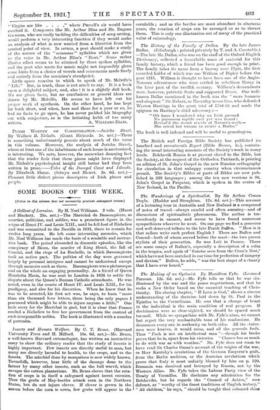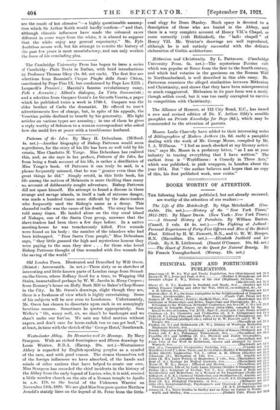The Making of an Optimist. By Hamilton Fyfe. (Leonard Parsons.
12s. 6d. net.)—Mr. Fyfe tells us that he was dis. illusioned by the war and the peace negotiations, and that ho seeks a New Order based on the essential teaching of Chris- tianity. His closing chapter, " If Love is God," shows a sincere understanding of the doctrine laid down by St. Paul in the Epistles to the Corinthians. He sees that a change of heart in the individual is the main condition of real progress. If doctrinaires were as clear-sighted, we should be spared much turmoil. While we sympathize with Mr. Fyfe's aims, we cannot but regret the very uncharitable tone of his confessions. Ho denounces every one in authority on both sides. All the states- men were knaves, it would seem, and all the generals fools. Thus " Foch is not an intellectual man "—though his books prove that he is, apart from his victories. " Chance has as much to do with war as with weather." Mr. Fyfc does not seem to have read Sir Charles Oman's account of the origins of the war, or Herr Kautsky's revelations of the German Emperor's guilt, from the Berlin archives, or the Austrian revelations which prove that Italy is most unfairly blamed by him on p. 120. Rumania was deceived and betrayed by Russia, not by the Western Allies. Mr. Fyfe takes the Labour Party view of the Treaty of Versailles. He disclaims any admiration for the Bolsheviks, but he regards the " Council of Action," now defunct, as " worthy of the finest traditions of English history." " All children," he says, " should be taught that coloured skins are the result of hot climates "—a highly questionable assump- tion which Sir Arthur Keith would hardly"confirm—" and that, although climatic influences have made the coloured races different in some ways from the white, it is absurd to suppose that the white enjoy any general superiority." Mr. Fyfe doubtless means well, but his attempt to rewrite the history of the past few years is most unsatisfactory, and can only weaken the force of his concluding plea.



































 Previous page
Previous page